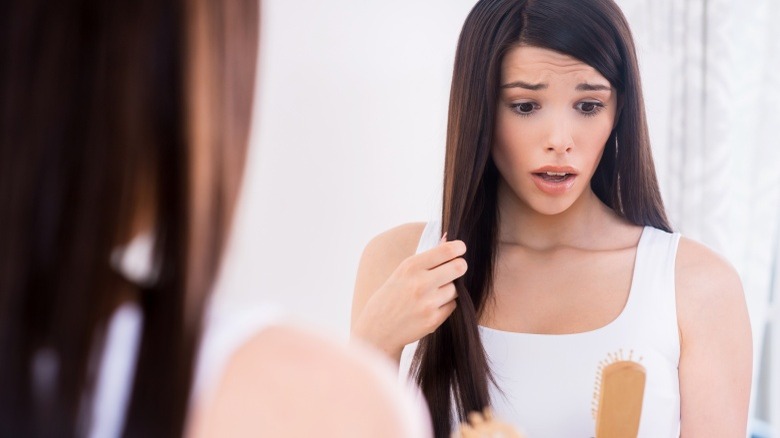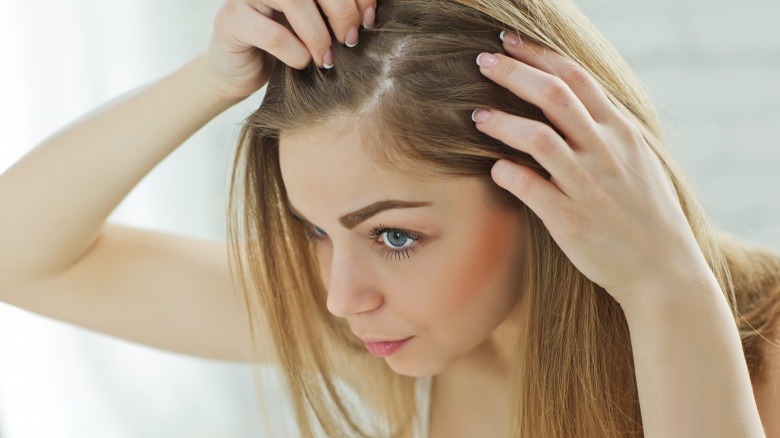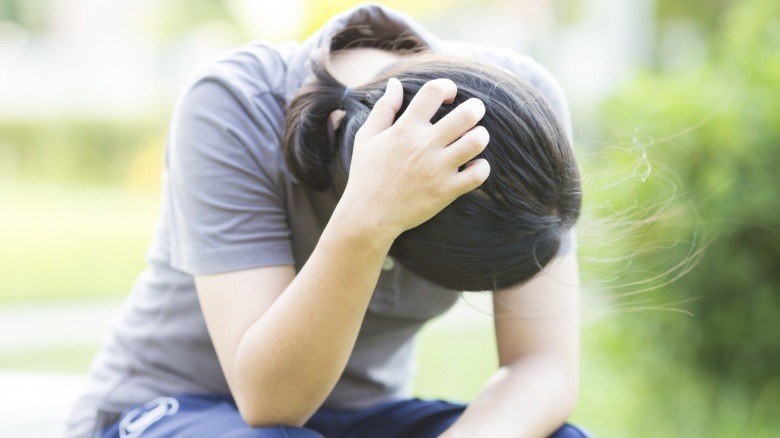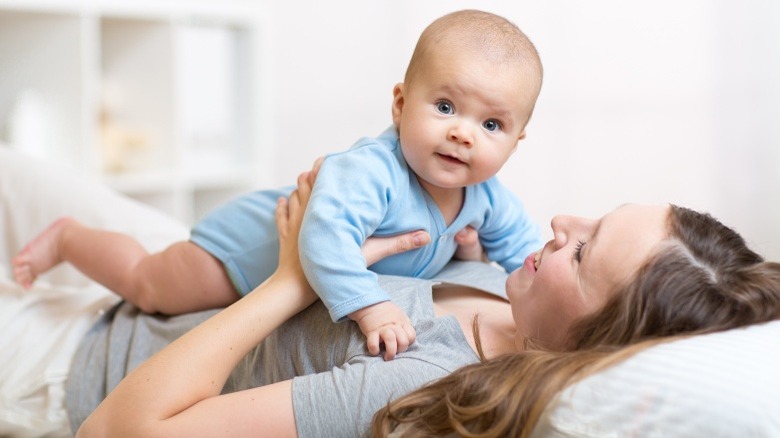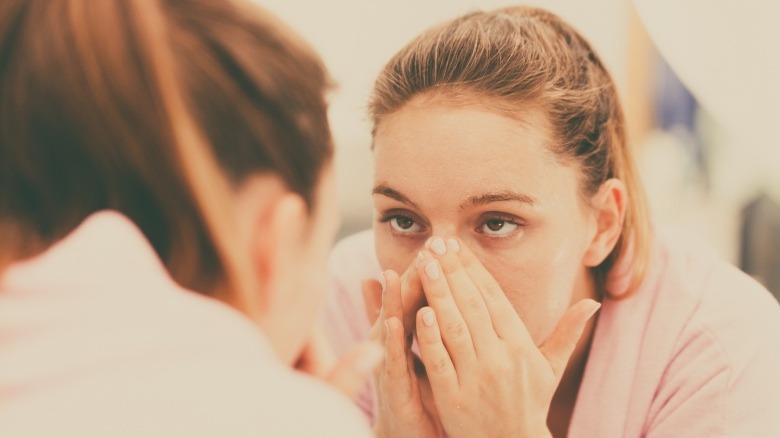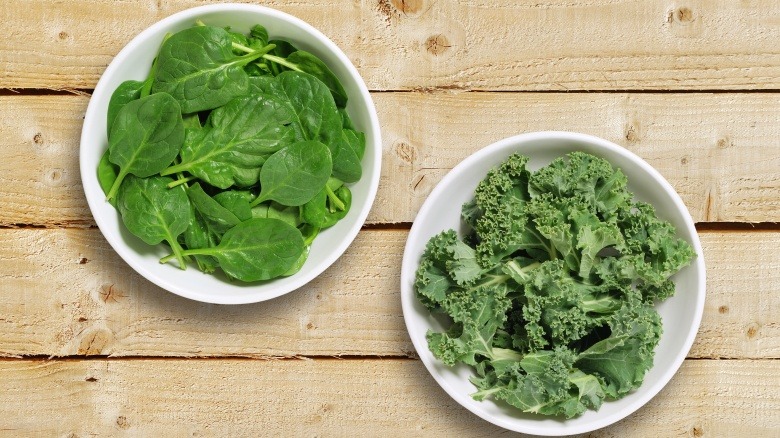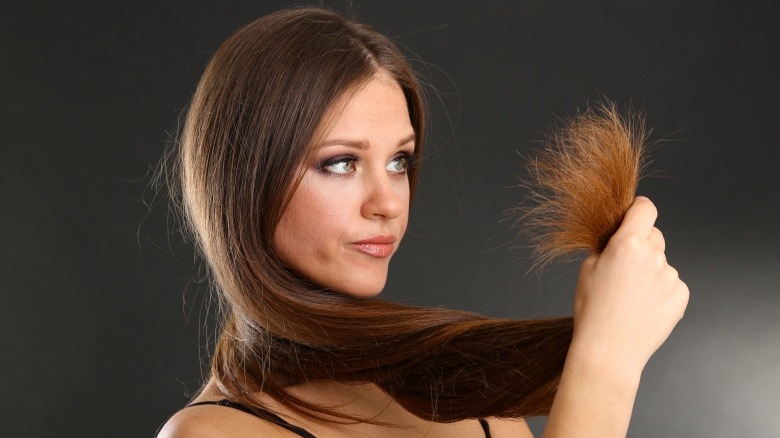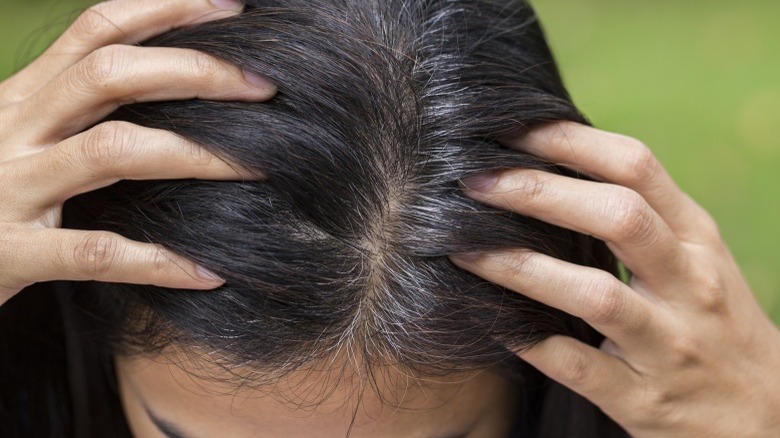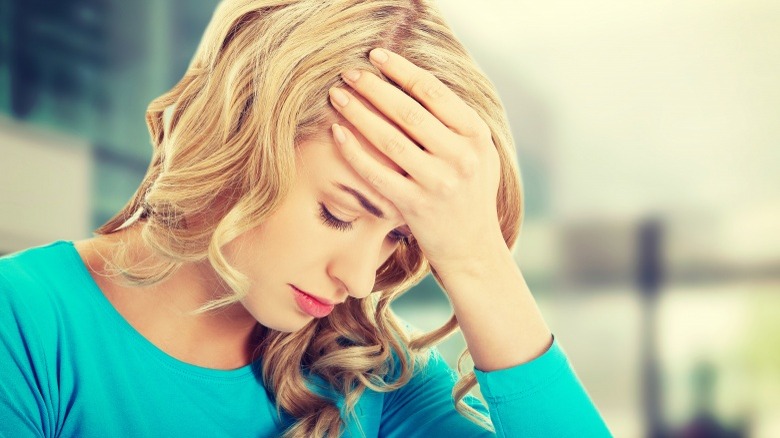What Your Hair Reveals About Your Health
Many women go to great lengths and spare no expense when it comes to getting the look, feel, color, and cut of the hair that they want. And while you may be busy spending lots of time (and money) on dyeing, curling, straightening, cutting, blow-drying, and chemically treating your hair to achieve the ideal style that you're seeking, it's important to look more closely at what your hair might actually be telling you.
In fact, your hair can provide great insight into your overall health and well-being, and it's important to recognize the many different ways in which the hair on your head can reflect what's happening inside your body. With this in mind, here's a closer look at the different health-related causes behind three of the most common hair conditions that women face: hair loss, lackluster locks, and gray hair.
If you're experiencing hair loss
Have you noticed that you've been losing a lot of hair recently? Perhaps you've seen large clumps left on your pillow when you get out of bed each morning or an unusually large amount in your drain after you shower. According to the American Academy of Dermatology, people tend to lose 50 to 100 strands of hair every day and up to 250 strands on days when they wash their hair.
However, if you're aware of the fact that your hair has been falling out in clumps, let this be a wake-up call that your body is trying to send you a critical message. There are many different medical conditions and circumstances that can bring about hair loss, and it's important to take note of the wide array of possible causes. To that end, if hair loss is something you're experiencing, one of the following health issues may be to blame.
Your thyroid isn't functioning properly
The thyroid is the butterfly-shaped endocrine gland that's found in the front of your neck, and its role is to release hormones that regulate your metabolism as well as several other bodily functions, such as your heartbeat, breathing rate, core body temperature, menstrual cycles, and cholesterol. When your thyroid isn't working properly, this hormonal imbalance can lead to numerous health issues, one of which is hair loss.
In fact, hair loss can result from both hyperthyroidism, which is caused by an overactive thyroid producing too many hormones, or hypothyroidism, which is caused by an under-active thyroid not producing enough hormones. So if you're experiencing significant hair loss, especially in addition to other symptoms, including unexplained weight gain, lethargy, memory difficulties, eye problems, and depression, an ill-functioning thyroid may be the culprit.
You have an infection
If you're experiencing hair loss, it's important to note that there are a variety of infections that can trigger this symptom. For example, ringworm is a fungal infection, and if it occurs on your head and scalp, it can make its way into the fibers of your hair and cause them to fall out. In addition, certain bacterial infections can cause folliculitis, which is the inflammation of your hair follicles, and this can also lead to hair loss. In fact, one of the most widespread types of folliculitis is known as "hot tub folliculitis," which is an infection caused by the bacteria found in poorly chlorinated water. Since hot tub folliculitis can result in hair loss, the thought of hopping into a hot tub may not be as relaxing as it once did.
You just had a baby
Your body goes through countless physical, emotional, and mental changes after you have a baby, and for many women, another possible reason behind their excessive hair loss occurs after pregnancy itself. To that end, after a woman gives birth, a condition known as telogen effluvium can occur, which is a sizeable loss of her hair. In fact, telogen effluvium typically happens during the first five months after pregnancy, and it affects nearly 50% of women.
So while you may find yourself shedding all over the place, the good news is that this kind of hair loss isn't permanent. To that end, it's interesting to note that during pregnancy, your increased estrogen levels can actually help your hair look and feel fuller. Who knew the bun in your oven could affect the hair on your head?
You have an iron deficiency
Iron is found in a variety of foods, including red meat, beans, kale, and dried fruits such as raisins, cranberries, and apricots. However, if you don't have enough iron in your blood, this can create numerous health problems, particularly in terms of your red blood cells and their ability to carry oxygen. With this in mind, some of the symptoms of low iron levels include lethargy and shortness of breath, and while it may surprise you, hair loss is also one of the tell-tale signs. In fact, your hair follicles need iron to help them grow, and research has shown that being iron deficient can lead to a loss of hair, especially for those who already have a genetic propensity to lose their hair in the future.
To that end, many women with heavy periods often experience an iron deficiency because of the large amounts of blood they lose each menstrual cycle, which is typically why it's rarer for postmenopausal women (and men in general) to experience this type of deficiency. However, while studies have demonstrated that taking iron supplements can help to prevent hair loss and even help to regrow hair that's fallen out, it's important to consult with your doctor before you begin to add any supplements to your daily regimen.
You're under a great deal of stress
Women have many different sources of stress in their lives, including their jobs, their families, their financial responsibilities, their social obligations, their outside commitments, and much more. And when it seems as though you're carrying the weight of the world on your shoulders, it's not surprising that a common side effect is the loss of your hair. To that end, when the stress in your life has become so great that it's seemingly insurmountable, it's possible to suffer from alopecia areata. This is a condition in which your body ends up attacking your own hair follicles and causes your hair to fall out, and moments of extreme stress can trigger this kind of bodily response.
Additionally, when your stress levels are at an all-time high and you feel as though you're being pulled in many different directions, it's not uncommon find yourself literally pulling out your hair from your head as a result. This condition is known as trichotillomania, and it's when you compulsively engage in the act of pulling out strands of your own hair. In fact, this undeniable urge to pull out your hair is often triggered by being under a great amount of stress, feeling lonely, depressed, and isolated, and it's often used as a coping mechanism for dealing with difficult and painful circumstances. In fact, it's even been said that those who engage in hair-pulling often have such impossibly high standards for themselves that they pull out their hair in order to deal with their own feelings of failure, disappointment, and dissatisfaction. While many consider trichotillomania to be a condition that's synonymous with perfectionism, it's extreme stress that's actually creating the perfect storm for hair loss.
You have a skin condition
If you're noticing that your hair is falling out, it's also possible that you're suffering from certain skin conditions. For example, over seven million people in the United States have psoriasis, and more than half of them will get an outbreak on their scalps at some point throughout their lives. And when this outbreak occurs, hair loss is often a common side effect, but the good news is that this hair loss isn't permanent.
In addition, for those who have seborrheic dermatitis, which is a skin condition that causes flakes, scales, and red blotches, hair loss is also likely when the infection occurs on a person's scalp. And while beauty is only skin deep, you have everything to gain by consulting with your dermatologist to ascertain if a problematic skin condition is behind your hair loss, and assess what you can do about it.
You're going through menopause
During menopause, a woman goes through a wide array of physical, mental, and hormonal changes, and it's not uncommon to find that a woman's hair can thin and even fall out in giant clumps during this transition. The hormones estrogen and progesterone are vital for hair growth and retention, so when your body produces less of them during menopause, a common side effect is hair loss. To that end, your body's lower levels of estrogen and progesterone can also lead to higher levels of androgens, which are male hormones, and these particular hormones can affect your hair follicles in such a way that they lead to hair loss. Another possible cause of hair loss during menopause is simply the stress and anxiety of going through such a momentous transition in your life.
You're overdoing your intake of vitamin A
Foods that contain vitamin A have long been touted as some of the healthiest items that you can eat. For example, popular sources of vitamin A include fish, carrots, sweet potatoes, kale, spinach, and collard greens. Vitamin A has been linked to numerous health benefits that are particularly advantageous for your eyes, bones, and skin. However, it's also been shown that having too much vitamin A, whether through the food you eat as well as any vitamin supplements that you may take, can actually have an adverse effect on your health and lead to hair loss.
It's important to note that the Mayo Clinic recommends that a woman should take 700 micrograms each day, so if you want to stay on your A game when it comes to your hair and your health, make sure you don't overdo the amount of vitamin A that you're ingesting on a daily basis.
If you have lackluster hair
Having brittle, dull, and lackluster hair are common hair complaints for many women, no matter their hair types. And while you may do everything in your power to add shine, body, volume, and texture to your hair, perhaps you've noticed that your attempts have literally fallen flat. In fact, not only does overworking, over-processing, and over-styling your hair end up hurting it overall, but there are other health-related factors that you may be overlooking when it comes to your seemingly misbehaving mane.
If your hair looks and feels unhealthy, it's important to look internally for possible causes. One of the following medical reasons may be to blame when your brittle, boring, and breakable hair is causing you heartbreak.
You're not getting enough protein
While you may not realize it, there's a powerful connection between your daily diet and your lovely locks. And when your daily regimen is lacking protein, not only will your muscles, immune system, and overall health suffer, but one of the many side effects is weak, brittle, and breakable hair. Each strand of hair consists of mostly protein, which is why your intake of the nutrient is so vital for hair growth. Further, if you're not ingesting enough protein, your body will do its best to conserve the little amount of protein you have for usage elsewhere, so your hair won't grow properly.
Luckily, adding more protein to your diet isn't too difficult as it's found in a variety of foods, including meats, fish, eggs, and dairy. And for those of you who are vegetarian or vegan, keep in mind that nuts, soy, tofu, and beans are all excellent sources of protein as well.
You're eating too much fast food
When looking more closely at your diet, it's worth noting that what you put into your system affects your whole body. And it's not too surprising that constantly hitting the fast food lines can negatively impact your health in numerous ways. In fact, consistently ingesting items that are high in sugar, carbs, calories, and saturated fats are putting you at risk for type 2 diabetes, obesity, high cholesterol, cardiovascular disease, sleep disturbances, and much more. But you may not have realized how simply eating the wrong kinds of foods is actually harming every single part of you, right down to your strands of hair.
Research has shown that those who eat fast food have a lower intake of healthier items, such as vegetables, fruits, as well as essential vitamins and minerals. And that means you're missing out on key nutrients that are crucial for hair growth. So if you're really looking to see a positive change in the quality and quantity of your hair, it's important to value healthy produce over expensive hair products.
You're on a dangerous diet
While it may seem counterintuitive, eating the wrong kinds of foods can also have the same impact on your hair as eating barely anything at all. And while you may be hoping to fit into a certain dress for a friend's wedding or are just trying to squeeze into your favorite skinny jeans for a night on the town, if you end up embarking on a crash diet and depriving yourself of proper nutrition, your weight loss may be soon be followed by hair loss.
In fact, due to the cycle in which your hair grows, it's been shown that hair loss can occur approximately three to six months after losing more than 15 pounds. To that end, it's not surprising that those who suffer from certain eating disorders, such as anorexia and bulimia, can end up with breakable, dull, and thinning hair as a result. In a word, a healthy diet is an essential part of having the vibrant hair you so desire.
If you have gray hair
As normal as it is, going gray can be a dreaded thought for many women as it's a blatant signal that you're getting older. But thanks to today's dyes, highlights, lowlights, mousses, and gloss treatments, you have the option of coloring your gray hair if you're so inclined. Whether you're looking for something that matches your natural tones, going bold with siren red or looking to pop with purple, it seems that the only color you're seeing less of these days is gray. And whether you go to a salon professional or you're a do-it-yourself dyeing diva, covering your grays is often considered a necessary evil for many women, as it can be time consuming, tedious, and costly. But what's really causing your hair to turn gray in the first place, other than simply getting older, of course? Read on to find out more.
It's genetic
Is your family tree filled with relatives who seem to have gone gray younger than expected? When it comes to going gray, one of the main causes behind this color change is simply your genetic makeup, and researchers have actually pinpointed the exact gene that's responsible for your graying hair color. In fact, the gene that controls and produces melanin, which is the pigment that determines your eye, skin, and hair color, starts producing less and less melanin as you age, and thus your hair starts turning gray. But precisely when this decrease in melanin happens is predetermined by your specific genes. This is why some women go gray in their twenties and others into their late forties or even fifties.
Also, while there's a common belief that plucking out your gray hairs will make even more grays grow in the future, it's important to debunk this fallacy right now. After all, only one hair can grow out of each individual follicle, so if you pluck one gray hair, what you'll likely get in its place is simply another gray hair. But before you celebrate, keep in mind that pulling out your hair puts you at risk of developing bald spots.
You're worrying too much
It's clear that constantly being worried and stressed can take a toll on your physical, emotional, and mental health. In fact, some side effects of being worried and distressed include chest pains, stomach aches, uncontrolled shaking, panic attacks, depression, as well as a lack of focus and mental acuity. And if that's not enough to worry about, if you're constantly in a state of stress, you're actually playing a part in turning your hair prematurely gray.
In fact, it's been shown that continually feeling stressed and anxious can accelerate the graying process due to the inflammation that this stress is causing throughout your body. However, there are steps you can take to manage your anxiety in ways that help (rather than harm) your hair and your health, such as deep breathing, guided imagery, exercise, practicing mindfulness, and mediation. In fact, your mantra can be "no gray today."

